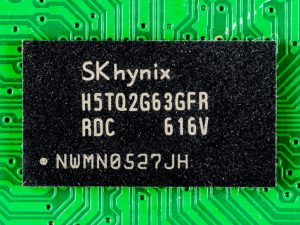The rapid expansion of the artificial intelligence (AI) market is generating strong tailwinds for many chipmakers. Nvidia, the leading producer of high-end data center GPUs, has probably been the biggest winner. Its stock has soared by about 2,470% over the past five years.
Nvidia continues to have potential as a great long-term investment in the future of the AI market, but investors shouldn’t overlook two other chipmakers that are expected to profit from this secular trend: Wolfspeed (NYSE: WOLF), a leading manufacturer of silicon carbide chips, and diversified tech giant Broadcom (NASDAQ: AVGO).
Let’s consider which of these two artificial intelligence stocks is the better buy today.
Wolfspeed, which was formerly known as Cree, mainly manufactures wide-bandgap (WBG) semiconductors made from silicon carbide and gallium nitride. These chips can operate at higher voltages, temperatures, and frequencies than traditional chips, which are made using silicon and gallium arsenide.
Their superior robustness makes Wolfspeed’s chips ideal for short-length LEDs, lasers, 5G base stations, and military radars. They’re also used in electric vehicles (EVs), solar panels, wind turbine systems, and power supply units for AI servers. There is demand for these chips, however, the sluggishness of the EV market has throttled Wolfspeed’s growth over the past two years.
Broadcom, which was known as Avago before it acquired the original Broadcom and inherited its brand in 2016, is more diversified. Its semiconductor division sells a wide range of chips for the mobile, wireless, networking, data storage, and industrial markets. Its infrastructure software business — which it expanded through its acquisitions of CA Technologies, Symantec’s enterprise security division, and VMware — provides a mix of on-premises and cloud-based software.
Most of Broadcom’s recent growth has been driven by the AI market, which drove data center operators to purchase more of its networking and optical chips. Management expects that segment’s growth will offset slower sales of non-AI chips and infrastructure software.
Wolfspeed’s revenue rose 42% in its fiscal 2022 (which ended in June 2022) as it lapped a pandemic-related slowdown and benefited from rising EV sales. But its revenues only rose 24% in fiscal 2023 and 6% in fiscal 2024.
That deceleration was caused by the cooling EV market, a surge in spending on AI GPUs that came at the expense of silicon carbide chips, and China’s export bans on gallium and germanium amid an escalating tech sector conflict. Wolfspeed’s adjusted gross margin plunged from 36% in fiscal 2022 to 13% in fiscal 2024, and it remains unprofitable on a generally accepted accounting principles (GAAP) basis. For fiscal 2025, analysts expect Wolfspeed’s revenue to dip 2% to $790 million, and foresee its net loss widening to $975 million.

